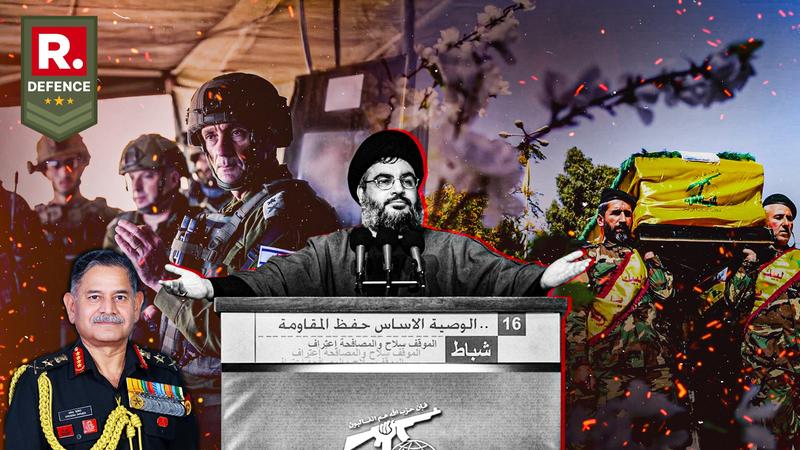Published 14:55 IST, October 1st 2024
‘War Starts Long Before the First Shot Is Fired’ Says Indian Army Chief on Israel's Pager Explosions
Indian Army Chief General Upendra Dwivedi recently commented on Israel’s innovative military tactic of using pagers as explosive devices.

New Delhi, India- Indian Army Chief General Upendra Dwivedi shared a significant statement recently, providing his expert analysis on Israel's recent tactic of turning pagers into explosive devices during their ongoing conflict with Hezbollah. The attack, which took place in Lebanon and Syria in mid-September 2024, marked a new chapter in asymmetric warfare, utilizing modified communication devices to target Hezbollah operatives. Gen. Dwivedi's remarks highlighted the strategic foresight behind such operations and underscored how India must learn from these developments to safeguard its security.
On 17 and 18 September 2024, Israel launched a covert strike using pagers and walkie-talkies laden with explosives, leading to the deaths of 42 individuals, including 12 civilians. The explosions marked one of Hezbollah’s biggest security breaches since its conflict with Israel reignited in October 2023. Thousands of handheld pagers, used by Hezbollah following instructions from their secretary-general Hassan Nasrallah, were targeted in these coordinated strikes. The devices had been compromised by Mossad, Israel's intelligence agency, which embedded the explosive PETN into them, resulting in a massive loss of life and serious injuries.
Gen. Dwivedi’s Analysis: IDF’s Strategic Marvel
In his analysis, General Upendra Dwivedi commented on the Israeli approach to asymmetric warfare and how they’ve innovated beyond traditional military tactics. He remarked:
"So let me take your point, number one, which you said that the ground offensive is ready to start. Israel's saying is ‘mow the grass, so that for some time thereafter, at least, there is rest. It will come up again. We will take care.’"

He continued by noting that, while Israel has consistently followed this doctrine of suppressing threats from Hamas or Hezbollah, this particular attack represented a strategic shift. Israel's focus on turning communication devices into weapons showcased a preparedness and long-term planning that caught Hezbollah off-guard:
"This time, they have done something different… The war does not start the day you start fighting. It starts the day you start planning," Dwivedi added.
He also emphasized the importance of technological and supply chain vigilance, highlighting how Israel’s covert use of a Taiwan-based company and a Hungarian intermediary to supply pagers to Hezbollah showcased a masterstroke in deception.
Lessons for India: Preparedness and Vigilance
General Dwivedi drew lessons from Israel’s tactic, pointing to the importance of supply chain interception and continuous surveillance to prevent similar threats from emerging in India:
"Supply chain interruption and interception are things we have to be very watchful of. We have to have various levels of inspection—whether it is at the technological level as well as manual level—to make sure such things do not get repeated in our case."
He stressed that this kind of attack required years of preparation. India must be ready to detect and intercept similar covert tactics in any potential future conflict, particularly with its own geopolitical threats from neighbouring adversaries.

The importance of thorough technological inspections, both at the manual and operational levels, was another focal point of his remarks. He stressed that India’s armed forces must remain vigilant to prevent supply chain vulnerabilities that could be exploited by hostile forces.
A New Form of Warfare
The use of explosive pagers by Israel signals a new era of warfare, where even communication devices are weaponized. This attack left Hezbollah stunned, both in terms of scale and methodology. Nasrallah, who had encouraged the use of pagers as a supposedly safer alternative to mobile phones, now faces significant losses in personnel and equipment.

General Dwivedi noted Israel’s precise method of targeting Hezbollah’s infrastructure. He elaborated on Israel’s use of sonic booms and signal triangulation to locate Nasrallah during a live broadcast, demonstrating the lengths to which Israel has gone to incapacitate its adversaries:
"They flew the aircraft in a manner that the sonic boom makes a sound in different timings. Nasrallah was creating a live relay… they carried out a triangulation methodology to focus which building is he staying in? That kind of a [tactic] is something which is never heard of earlier."
What’s next in the Israel-Hezbollah Conflict?
As Israel intensifies its ground operations in Lebanon, Hezbollah continues to retaliate, launching rocket attacks against northern Israeli cities. This ongoing conflict has captured global attention, and India, as General Dwivedi emphasized, must remain attentive to the shifting nature of warfare in the region.

For India, the implications of this development are clear: technological innovation and covert tactics will play an increasing role in modern conflicts, and India must be prepared. Whether it involves strengthening supply chain inspections, enhancing electronic warfare capabilities, or remaining vigilant against similar vulnerabilities, General Dwivedi’s words underline the need for constant vigilance in safeguarding national security.
As the conflict between Israel and Hezbollah escalates, India watches closely, with key lessons being drawn from both the successes and missteps in this ever-evolving battlefield.
Updated 20:36 IST, October 1st 2024




